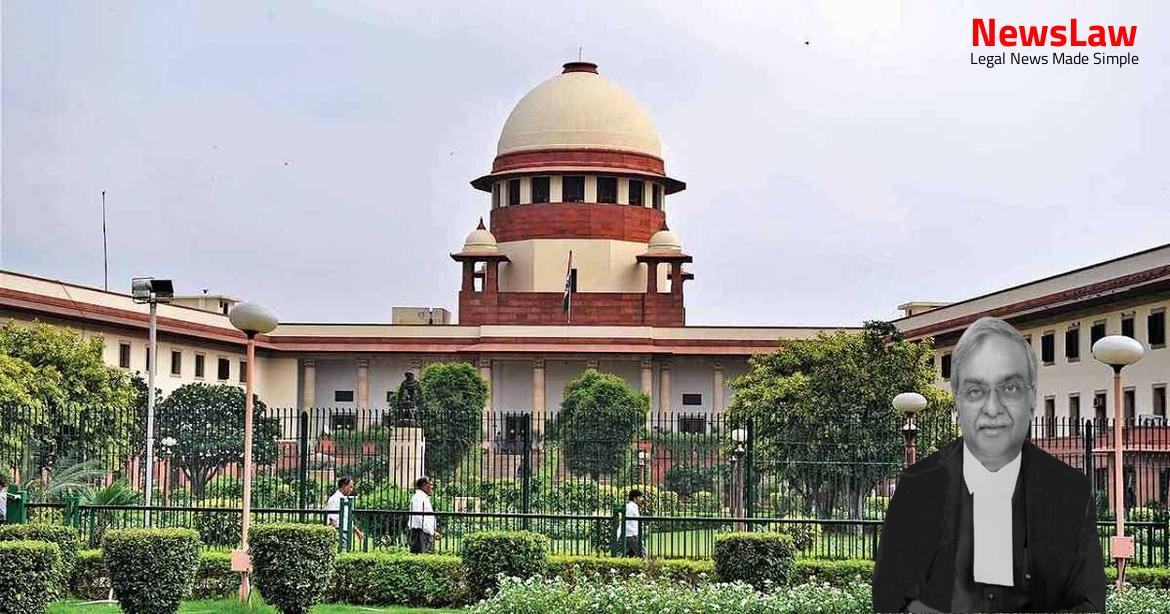In the case involving the Appellant and the Scrutiny Committee, the High Court recently set aside the caste validity certificate, raising questions about the authenticity of the claim. However, the Senior Counsel representing the Appellant challenged this decision, arguing that the Scrutiny Committee’s findings were based on valid documents. The High Court’s intervention led to further scrutiny of the case, but the Supreme Court ultimately upheld the Scrutiny Committee’s decision. This case sheds light on the complexities of verifying caste claims and the authority of fact-finding bodies in such disputes.
Facts
- The genesis of the dispute dates back to 2013 when complaints were filed against the Appellant seeking cancellation of her caste validity certificate.
- The High Court set aside the caste validity certificate in 2017 and remanded the matter to the Scrutiny Committee for further review.
- The controversy centers around the validation of the caste claim by the Appellant, which led to challenges to her candidature on a reserved seat.
- The Appellant contested in the 2019 Parliamentary election as an independent candidate on a Scheduled Caste reserved seat and emerged as the winner.
- The Scrutiny Committee conducted a fact-finding exercise post remand by the High Court in 2017.
- The Appellant, represented by Senior Counsel Mr. Dhruv Mehta, argued that the High Court erred in overturning the detailed findings of the Scrutiny Committee through a writ of certiorari under Article 226 of the Indian Constitution.
- It was contended that the High Court should not have interfered in the matter as the Scrutiny Committee had conducted a thorough fact-finding exercise before accepting the caste claim of the Appellant.
- The scope of jurisdiction in such cases is limited to examining whether the lower authorities acted without jurisdiction, in excess of jurisdiction, or due to a failure to exercise jurisdiction.
- The Scrutiny Committee, acting as a quasi-judicial authority under the ‘2000 Act’, had adjudicated the caste claim of the Appellant based on legitimate documents.
- The High Court, however, quashed the Scrutiny Committee’s decision, alleging fraudulent acquisition of the caste certificate, and imposed a heavy cost on the Appellant along with the directive to surrender the certificate.
- The Appellant filed a writ petition seeking to set aside the findings of the Scrutiny Committee, specifically challenging the ‘non-consideration’ of crucial documents supporting her caste claim.
- It was argued that the roving inquiry by the High Court was unwarranted, especially when there were no allegations of jurisdictional issues against the Scrutiny Committee.
- The documents submitted by the Appellant, pertaining to her forefathers from the pre-independence era, carried a statutory presumption under the Indian Evidence Act and should have been considered unless adverse findings were made by the Vigilance Cell.
- Citing relevant legal precedents, the Appellant’s counsel contended that the Scrutiny Committee failed in its duty by deeming the documents inadmissible without proper justification.
Also Read: Selection Committee Bias Case: Appellants vs. Madhya Pradesh Authorities
Arguments
- Learned Senior Counsel argued that the scope of interference with the Scheduled Castes Order, 1950 issued by the President under Article 341 of the Constitution is constitutionally impossible.
- Specific castes like ‘Ravidasia Mochi’ or ‘Sikh Chamar’ not originally mentioned in the Presidential Order for Maharashtra State, no caste certificate could have been conferred in favor of the Appellant.
- The issue of interfering with the Presidential Order has been settled by judgments passed by the Supreme Court, including Constitution Bench judgments.
- The Presidential Order is to be read as it is, and no further interpretation is permissible by any authority according to the judgments.
- The argument concluded that once the Presidential Order speaks for itself, there is no need for interference or adjudication by the Court.
- Fraudulent procurement of caste certificate highlighted as a long-standing issue
- Appellant accused of using ‘trial and error’ method with forged documents
- Self-contradictory nature of documents supporting caste claim pointed out
- Scrutiny Committee’s error in validating Appellant’s claim as ‘Sikh-Chamar’ or ‘Ravidasia Mochi’ noted
- Documents submitted by Appellant deemed forged and fabricated
- Father’s school leaving certificate and caste certificate found to be forged and cancelled
Also Read: K.G. Premshanker vs Inspector of Police & Anr. Legal Case Summary
Analysis
- The High Court delved into the credibility of the Scrutiny Committee’s opinion, feeling the need to substitute its own views.
- The High Court observed heavy reliance by the Scrutiny Committee on an affidavit for substantiating a rent agreement.
- The Scrutiny Committee is empowered with fact-finding authority, and if its findings are based on specified materials followed by subjective satisfaction, challenging them via a writ of certiorari is unwarranted.
- In this case, the High Court’s extensive re-appraisal of evidence was deemed unnecessary as it did not show bias or lack of jurisdiction by the Scrutiny Committee.
- The Scrutiny Committee passed a detailed order after considering objections, validating the caste certificate primarily based on vigilance cell report and home enquiry.
- The High Court’s interference with the Scrutiny Committee’s decision was viewed as overstepping, especially without allegations of mala-fide or perversity.
- The Act and Rules govern the procedure for validation of caste certificates, emphasizing the Scrutiny Committee’s finality, subject only to challenges under Article 226.
- The Scrutiny Committee was justified in admitting certain documents, like a bona-fide certificate and tenancy indenture, based on its subjective satisfaction and proper consideration of evidence.
- The Scrutiny Committee’s decision, following due process and principles of natural justice, should generally be respected as long as it is based on reliable and relevant material.
- The oversight of the Scrutiny Committee orders is limited under the law, barring exceptional circumstances such as bias, malice, or lack of jurisdiction.
- In the case of ‘Kumari Madhuri Patil Vs. Additional Commissioner, Tribal Development and Others’, the Supreme Court expressed concerns about the deprivation of benefits to genuine candidates due to fraudulent caste certificates obtained through forged documents.
- The need to streamline the procedure for issuance, scrutiny, and validation of caste certificates was emphasized by the Court.
- Challenges to decisions made by the Scrutiny Committee can be brought under Article 226 in High Court but should not lead to fact-finding exercises by superior courts.
- Superior courts should not interfere with findings unless they are perverse, and writs for certiorari should not be based on insufficiency or adequacy of evidence unless the finding is challenged on those grounds.
- Exclusive jurisdiction in assessing the adequacy of evidence lies with the Scrutiny Committee and High Courts should not entertain challenges on such grounds routinely.
- The Court’s jurisdiction being barred rightly by a judgment was discussed in the case of ‘Dayaram Vs. Sudhir Batham and Others’ and relevant observations from ‘Indian Overseas Bank’ were referred to.
- The importance of the affinity test in adjudicating caste claims based on caste certificates was highlighted in the ‘Mah. Adiwasi Thakur Jamat Swarakshan Samiti’ case.
- Procedural guidelines for verifying caste claims and the role of the Scrutiny Committee were outlined by the Supreme Court in various judgments.
- The writ of certiorari is meant to cure jurisdictional errors and is not a tool for substituting decisions of fact-finding authorities like the Scrutiny Committee.
- The certificates issued by the Scrutiny Committee must be scrutinized promptly and with utmost expedition to ensure the correct verification of caste claims.
- The Scrutiny Committee has the power to verify the correctness of caste certificates issued by the Competent Authority.
- The Scrutiny Committee can cancel and confiscate a false caste certificate obtained fraudulently by a person not belonging to Scheduled Castes, Scheduled Tribes, etc.
- The Scrutiny Committee must ensure that applications for caste certificate verification are complete and carry out scrutiny.
- The Scrutiny Committee must provide the person concerned an opportunity to be heard before passing any orders.
- The orders passed by the Scrutiny Committee are final and can only be challenged before the High Court.
- The Vigilance Cell does not record concluding remarks or opinions and its findings are not binding on the Scrutiny Committee.
- Appointing authorities must make applications for verification of caste certificates for candidates selected for appointments in various institutions.
- The Scrutiny Committee has the exclusive authority to adjudicate claims related to Scheduled Castes, Scheduled Tribes, etc.
- Appellant did not claim ‘Mochi’ caste based on her caste in some other State.
- Appellant claimed ‘Mochi’ based on genealogical caste history of her forefathers.
- The Scrutiny Committee verified the claim and confirmed that the Appellant belongs to the ‘Mochi’ caste as per Entry 11 of Presidential Order applicable to Maharashtra.
Also Read: Transfer of Investigation to CBI in the Case of Manipur Call Centre Employee’s Death
Decision
- Validation order dated 03.11.2017 passed by the Scrutiny Committee is restored.
- No order as to costs.
- The instant appeals are allowed, and the impugned judgment passed by the High Court is set aside.
- Pending application(s), if any, shall also stand disposed of.
Case Title: NAVNEET KAUR HARBHAJANSING KUNDLES @ NAVNEET KAUR RAVI RANA Vs. THE STATE OF MAHARASHTRA (2024 INSC 266)
Case Number: C.A. No.-002741-002743 / 2024



